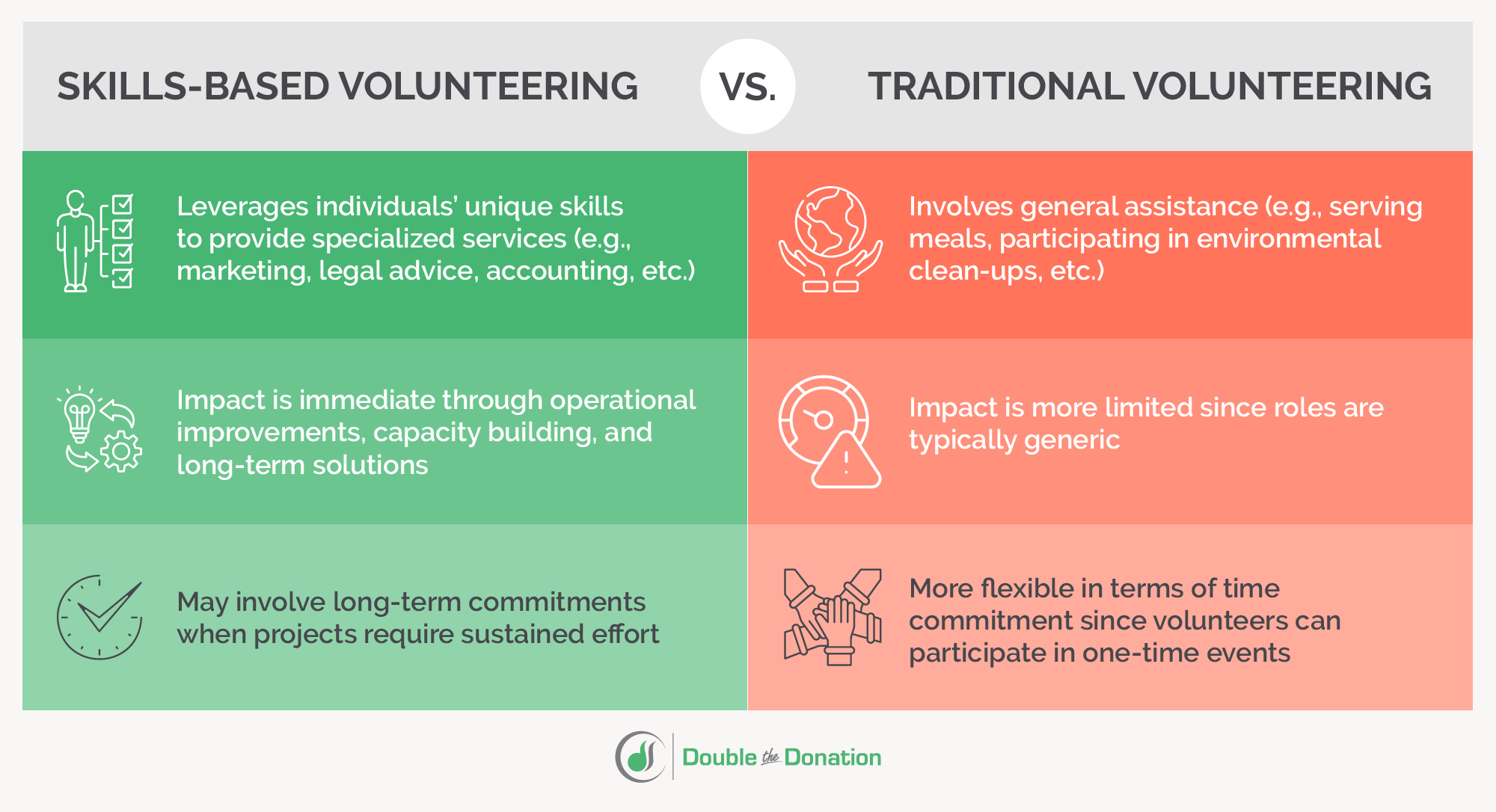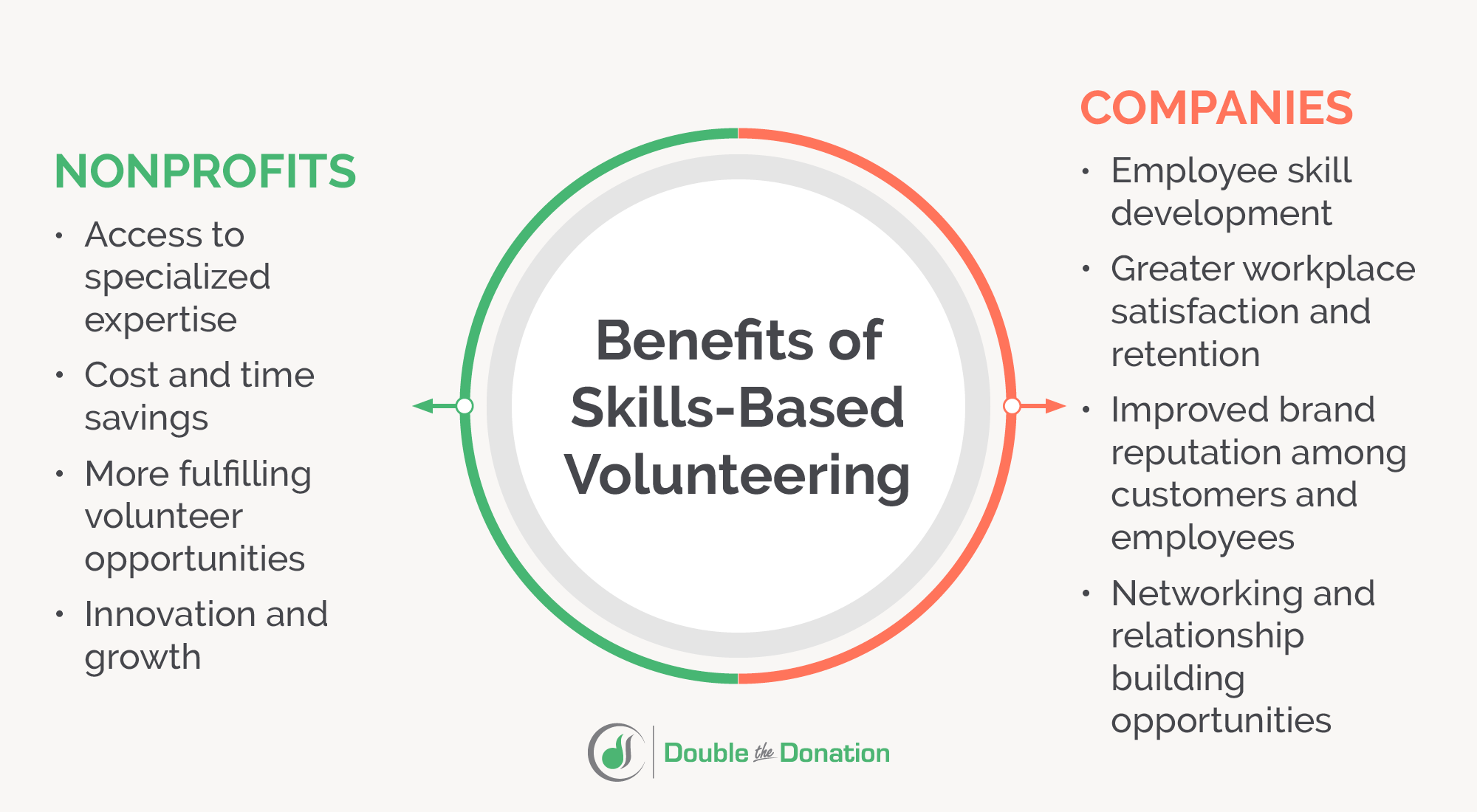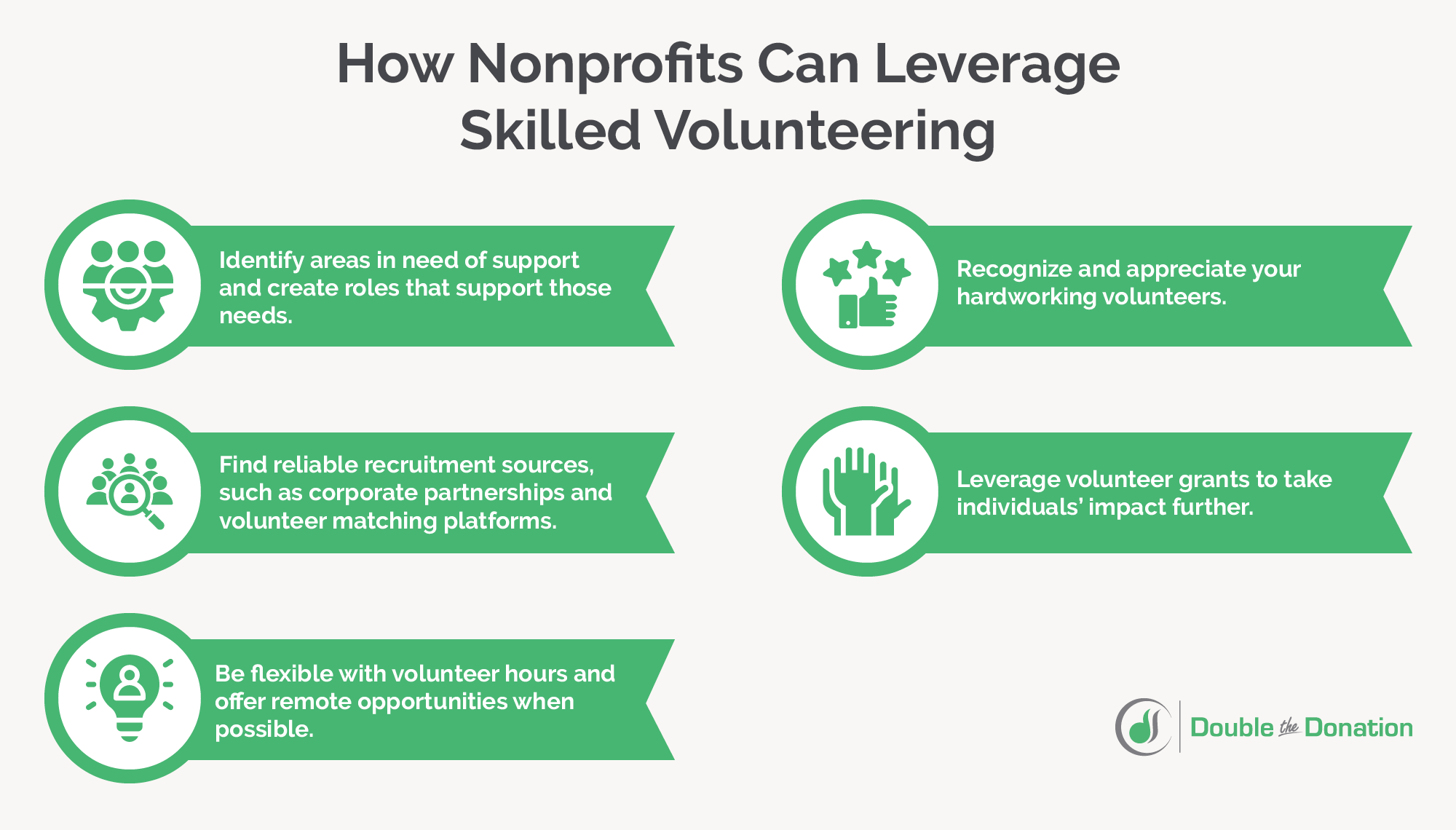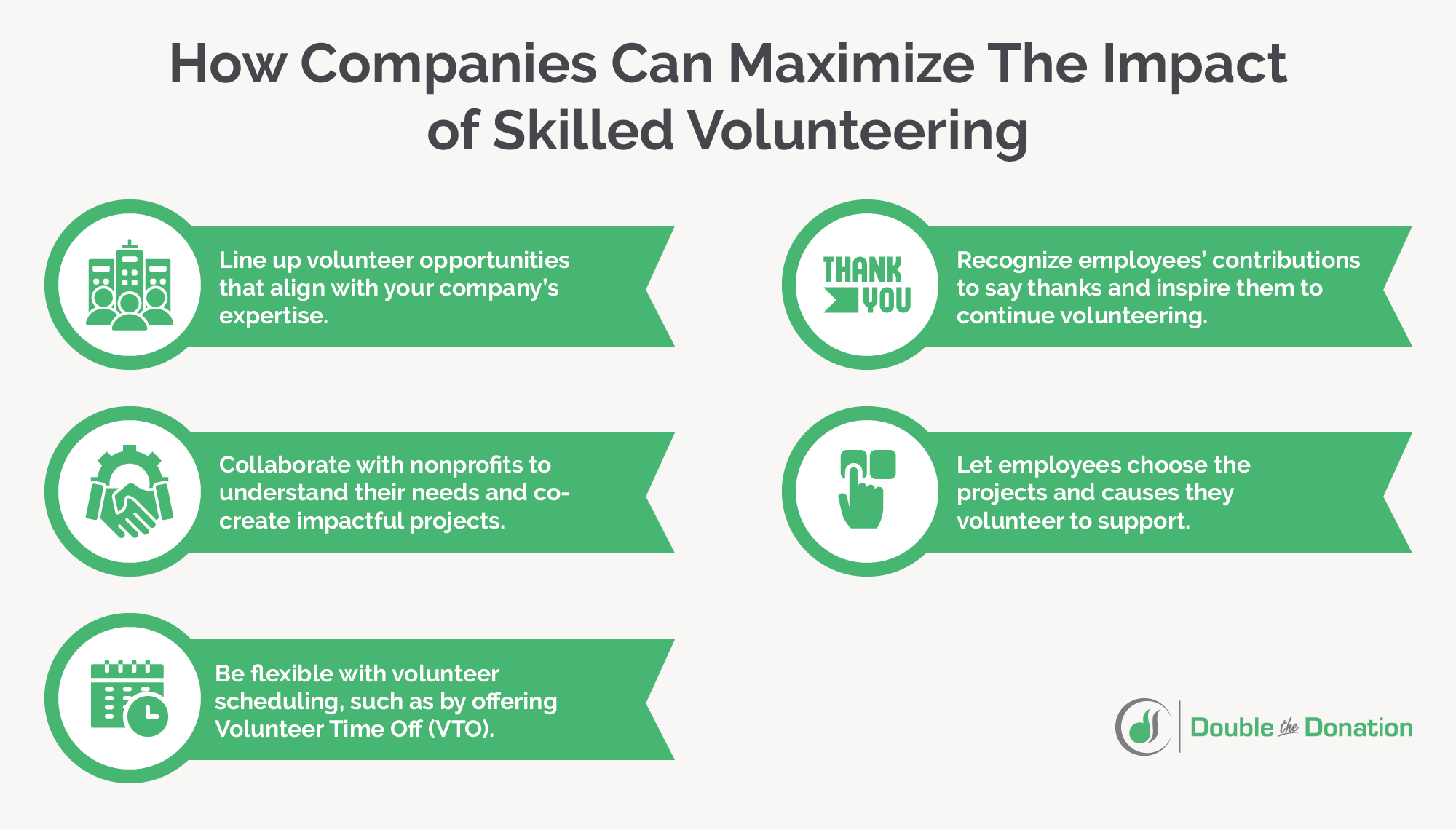Skills-Based Volunteering: What It Is & How It’s Rewarding
Volunteering isn’t just about goodwill—it’s about leveraging our collective expertise to help others. Skills-based volunteering taps into the vast reservoir of knowledge within our communities, creating unique and rewarding opportunities for individuals to give back.
This form of volunteerism benefits not only nonprofits but also the volunteers and the companies they work for. Nonprofits get much-needed assistance, volunteers use their skills to help their communities, and companies enhance their images. In fact, CSR research has found that 93% of employees think companies should lead with purpose, and volunteerism is a great way to accomplish that! It’s a win-win-win, but only if each party approaches it strategically.
In this article, we’ll explore skills-based volunteering and how it creates a rewarding scenario for all. Here’s what we’ll cover:
- What is skills-based volunteering?
- What are the benefits of skills-based volunteering?
- Best practices to make the most of skills-based volunteering
No matter if you’re a nonprofit leader, company executive, or volunteer looking to make a difference, there’s something in this guide for everyone. Let’s dive in to discover the impact of skilled volunteering.
What is skills-based volunteering?
Also referred to as SBV, skills-based volunteering is a form of volunteerism in which individuals use their specialized skills and professional knowledge to assist nonprofits, community organizations, or other philanthropic causes free of charge.
Often facilitated through employee giving programs, skills-based volunteers contribute their talents and capabilities to charitable organizations to help address complex challenges, enhance organizational capacity, or advance specific projects. For instance, a nonprofit may need help with its email communications. As part of SBV, a digital marketing firm could step in to create engaging newsletters and emails that inspire recipients.
Common types of skills-based volunteering
One of the best aspects of skilled volunteerism is its flexibility. Individuals can give back however suits their unique skill sets. Pro-bono support may include activities such as:
- Marketing and communications like preparing external newsletters or designing program brochures
- Financial management such as finding new fundraising sources or preparing grant proposals
- Technology and IT support
- Translating documents or other texts
- Online fundraising support such as conducting a peer-to-peer fundraiser
- Mentoring youth, adults looking for jobs, or others
- Graphic design support, such as designing social media infographics or website assets
Knowing how individuals can lend their expertise empowers companies and nonprofits alike to offer worthwhile opportunities that further their philanthropic mission.
How skilled volunteering differs from traditional volunteering
While traditional and skilled volunteering are both rewarding, they have some key differences:
- Nature of contributions: Skilled volunteering leverages individuals’ unique expertise to provide specialized services, like marketing, legal advice, accounting, and project management. Meanwhile, traditional volunteerism requires individuals to provide general assistance, such as serving meals or participating in environmental clean-ups.
- Impact and value: While traditional volunteering provides vital support to nonprofits, its impact can be more limited than skilled volunteering. Skill-based volunteering delivers immediate, substantial impact through operational improvements, capacity building, and long-term solutions to complex issues.
- Time commitment: Traditional volunteering opportunities tend to be flexible since volunteers can participate in one-time events. In contrast, skilled volunteering may involve long-term commitments for projects that require sustained effort and specialized skill sets.
What are the benefits of skills-based volunteering?
Let’s take a closer look at how skilled volunteering impacts each party involved.
The Nonprofit Perspective
Volunteers are the lifeblood of nonprofit organizations. In fact, one-third of the nonprofit workforce is volunteers.
Here’s a breakdown of the greatest benefits skills-based volunteering brings nonprofits:
- Access to specialized expertise: Skilled volunteers bring professional expertise and knowledge that nonprofits may not have in-house. This expertise can cover areas such as finance, marketing, technology, project management, and more. By tapping into these skills, nonprofits can address critical challenges, enhance their programs, and advance their missions.
- Cost and time savings: Skilled volunteers offer pro bono services to nonprofits, making this a cost-effective way to access high-quality expertise. This is particularly valuable for nonprofits with limited budgets and time constraints. Independent Sector estimates that the current value of each volunteer hour is $31.80. By lending these valuable services for free, skilled volunteers can expedite projects without sacrificing quality.
- More fulfilling volunteer opportunities: Supporters want to make an impact. By sharing their specialized skills, they can feel like they’re making a difference, leading to greater volunteer retention rates.
- Innovation and growth: Skilled volunteers introduce innovative ideas and fresh perspectives to nonprofits. This enables organizations to adapt to changing environments, explore new revenue streams, and identify growth opportunities.
This is just the tip of the iceberg! The benefits of skilled volunteering run deep. Overall, this form of volunteering enriches nonprofits and enables them to fulfill their missions more effectively.
The Company’s Perspective
The companies that encourage employees to volunteer do so for a reason! Workplace giving is a powerful way to give back and supply employees with rewarding experiences.
Here are some of the biggest benefits of skills-based volunteering for companies and their employees:
- Employee skill development: Through volunteering, employees can put their current expertise into practice and even develop new skills. In fact, skill-based volunteer programs help individuals build new, job-related skills at 95% the rate of traditional volunteer projects. In addition to practicing hard skills, employees commonly develop soft skills through volunteerism including self-motivation, leadership, conflict resolution, problem-solving, communication, and teamwork.
- Employee satisfaction and retention: Empowering employees to use their professional skills for a meaningful cause can improve job satisfaction, leading to happier and more motivated employees. Overall, companies that offer skilled volunteering are more desirable places to work since 71% of employees say it’s imperative their employer supports giving and volunteering.
- Improved brand reputation: Today’s businesses recognize their duty to be socially responsible and give back to the communities that support them. Companies that engage in skilled volunteering demonstrate a commitment to corporate social responsibility (CSR), and customers, clients, and employees alike appreciate philanthropic efforts like these.
- Networking and relationship building: About 35% of individuals volunteer to socialize. By encouraging skilled volunteering, companies enable employees to interact with one another and form new connections with others in the nonprofit sector.
From improving their business’s reputation to keeping employees happy, it’s not hard to see why skilled volunteering is a priority among today’s companies.
Best practices to make the most of skills-based volunteering
For skilled volunteering to be as impactful as possible, companies and benefitting organizations both need to be strategic. Let’s explore some actionable guidance for nonprofits and companies to maximize impact.
Tips for nonprofits
To experience all the great benefits we covered above, nonprofits should be smart about the skills-based volunteer opportunities they offer. Here are some tips for nonprofits to infuse skilled volunteerism into their operations:
- Identify organizational needs. Knowing the areas where a nonprofit needs support will help create volunteer roles that support those needs. For instance, a nonprofit may need help completing their tax forms, in which case they may turn to a local accounting firm.
- Be smart about recruitment. Recruit skilled volunteers through targeted channels, such as professional associations, corporate partnerships, or volunteer matching platforms. You can even look for those who work for companies with VTO programs as an easy way to expand engagement! While these volunteers already have the necessary skills, provide comprehensive onboarding to ensure they are well-prepared.
- Offer flexible volunteer opportunities. Be flexible with volunteer scheduling, recognizing that skilled volunteers likely have other commitments. Offer options for remote or flexible volunteering when possible. For example, a volunteer graphic designer can likely work entirely remotely and asynchronously.
- Recognize and appreciate volunteers. Supporters offer their valuable time and skills free of charge. The very least nonprofits should do is say thanks. Shout out volunteers on social media, send custom thank-you letters, or create heartfelt thank-you videos.
- Leverage volunteer grants to take impact further. Look into volunteers’ employers to determine if they’re eligible for volunteer grants. Through these programs, companies promise to donate to nonprofits where employees regularly volunteer. Our matching gift database even stores information on volunteer grants, so you can identify these opportunities more easily.
By following these tips, nonprofits can harness the expertise of skilled volunteers to address critical needs, strengthen organizational capacity, and advance worthwhile missions.
Tips for companies
Lining up skilled volunteering opportunities is a smart move for companies. Here are some tips businesses can use to effectively engage in skills-based volunteering and maximize the positive impact they have through this type of corporate giving:
- Line up volunteer opportunities that align with the company’s needs and expertise. Much like nonprofits, companies should assess their needs before choosing volunteer activities for employees. Begin by identifying the specific needs and challenges your company can address. Consider areas where your employees’ expertise can make a significant impact.
- Collaborate with nonprofits. Establish partnerships with nonprofit organizations that align with your company’s mission. Work closely with nonprofits to understand their needs and co-create impactful projects. Establishing ongoing partnerships can turn skills-based volunteering into a long-term commitment, continuously engaging your employees in meaningful volunteer opportunities.
- Be flexible with scheduling. Support employees’ volunteer commitments by allowing them to allocate time during work hours or by offering flexible scheduling options. An increasing number of companies offer Volunteer Time Off (VTO) to allow employees to give back during work hours without sacrificing their paychecks.
- Recognize and celebrate employees’ contributions. Volunteering should never be mandatory, so recognize those who participate out of the goodness of their hearts. Consider incentives such as gift cards or charitable giving stipends to acknowledge employees’ generous efforts and contributions.
- Let employees choose their opportunities. Volunteer work is more impactful when individuals are excited to give back. Allow employees to choose projects or causes that resonate with them. Empower them to leverage their passions and skills for the greater good in the ways they prefer.
Remember, workplace giving is just as valuable for employees. Remind employees to be flexible, committed, and open to learning during their volunteer experiences, and line up opportunities they’ll appreciate.
For Companies: Discover corporate volunteer ideas employees will love.
Final Thoughts on Skills-Based Volunteering
With professionals seeking more meaningful ways to contribute, skills-based volunteering is reshaping the volunteering landscape. Whether you work for a nonprofit that needs specialized assistance or a company looking to give back, skilled volunteering can help make your job easier and grow your impact.
Remember to consider your organization’s needs and be strategic with volunteer opportunities. In turn, it can be a win-win-win for companies, their employees, and benefitting nonprofits.
The world of corporate giving is expansive, and we’re excited to share additional resources to help you leverage it. To continue learning, explore these educational resources:
- Corporate Volunteerism: A Guide for Purpose-Driven Companies. Companies can give back to society and support employees’ philanthropic needs through volunteerism. Discover its impact and see real-world examples in this guide for company leaders.
- Why Workplace Giving Matters for Nonprofits + Companies. Volunteering is just one way companies support nonprofits. Discover other employee giving programs and how they benefit both nonprofits and companies.
- The Ultimate Fundraising Guide to Corporate Giving Programs. Nonprofits can accomplish more for their missions through volunteerism, matching gifts, and other forms of corporate giving. Discover everything nonprofits need to know about corporate giving programs.








